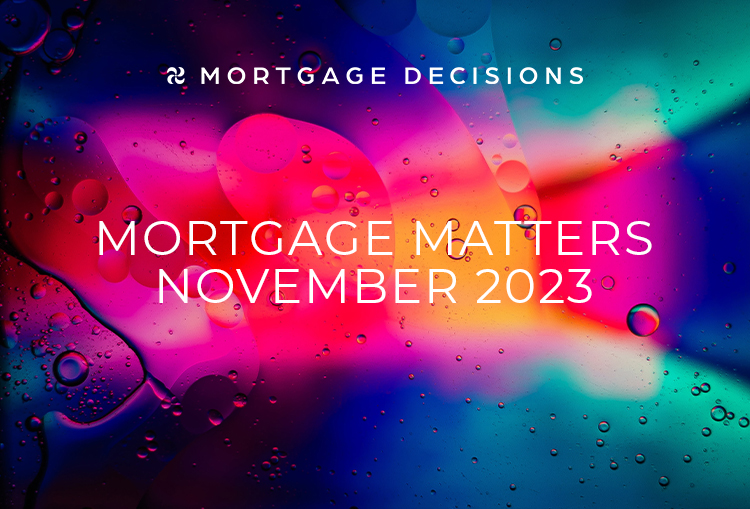- Mortgages
Mortgages
Bad Credit Mortgages
- Shared Ownership
- Insurance
Insurance
Life Insurance for Families
Life Insurance for Seniors
- Specialist lending
- About
- Events

Mortgage rates continue to edge downwards, the average two-year fixed mortgage rate is 6.29% and the five-year is 5.87%, down from 6.67% and 6.17% respectively since the start of September (Moneyfacts). For the first time in three months, the cheapest five-year deals start with a ‘4’, with major lenders cutting their rates. High Net Worth clients are tending to angle towards tracker mortgages for increased flexibility in the hope that rates continue to drop, whereas typical first-time buyers are more likely to go for five-year fixes, preferring to know where they stand.
The bank rate was held once again at 5.25%, which has instilled more confidence in the market. Consumer confidence rose to –21 in September 2023, its highest reading since January 2022 (GfK Consumer Confidence Tracker). Consensus forecasts by HM Treasury suggest that interest rates are at their peak and will fall to 4.7% by the end of 2024 (HM Treasury Forecasts October 2023). Swap rates are at their lowest level since May, improving confidence in the market, although we’re unlikely to see significant rate cuts unless inflation starts to fall more sharply. However, lenders are actively trying to encourage borrowing as we approach the end of the year, undercutting each other by dropping rates as well as stress test levels. With high competition, lenders are loosening their criteria to open the door to more people, and the availability of product switching onto a better deal is also encouraging people to go ahead with the move. Competition is increasing in the buy-to-let market too, with the average two-year fix now at 6.24% and the average five-year deal at 6.17%, down from 6.97% and 6.82% respectively in July (Moneyfacts).
The market is still adjusting to higher interest rates and mortgage approvals remain below the long-term average at 43,300 in September, although up 9% on the start of the year (Bank of England). However, with interest rates at or close to their peak, activity should improve in spring, fuelled by pent-up demand, lowering inflation and the usual season peak. The number of cash buyers has increased; around 60,000 more properties were bought with cash this year than 2022 (Zoopla, to October 2023).
Despite high costs, first-time buyers made up 53% of all home moves in the third quarter of the year, the greatest proportion in over a year (reallymoving). Often cheaper than renting, there has been an uptick in the number of enquiries in the shared ownership and 95% mortgage schemes. With lowering house prices and the ability to negotiate prices down, fewer first-time buyers are being priced out of the market compared to a year ago. With the likelihood of rates coming down and rising rents, more first-time buyers may enter the market in the coming months. The Bank of Mum and Dad is expected to lend a record £8.1 billion this year (Legal & General), giving many first-time buyers the means to buy.
The government is considering extending its mortgage guarantee scheme as one of the measures to help first-time buyers onto the property ladder in the upcoming Autumn Statement. The scheme, which helps first-time buyers take out a mortgage with a 5% deposit for properties worth up to £600,000, may be made available for another year. Other ways of helping people on to the property ladder are also being examined, such as improvements to existing ISA products or introducing new tax-free savings options.
Disclaimer: The above is for information only. Independent regulated financial advice should always be sought when considering mortgage matters.
Your home may be repossessed if you do not keep up repayments on your mortgage.
There may be a fee for mortgage advice. The actual amount you pay will depend upon your circumstances.
The fee is up to 1% but a typical fee is £595.
